Our favorite Indian restaurant, Tandoor, closed on June 30, 2015. Tandoor’s departure has left a hole in our hearts. When we go to our “new” place a mere block away, we pass by Tandoor and reminisce.
Tandoor closed because the building owner is demolishing the half block or so of which Tandoor is a part and is building an apartment building with retail below. The block was beginning to look dilapidated, but it could have been fixed. It just wasn’t worth it to the owner. The entire street was filled with mom and pop stores. The family at Tandoor looked for comparable space elsewhere in their price range but couldn’t find it. Seattle is on steroids right now in terms of the amount of money being invested here. When my husband decided to help them look for retail space by making some calls, he learned that the new buildings preferred a stable chain like Subway. Great, that’s what we need around here- another Subway. So this family restaurant closed it doors at the end of June after 25 years in operation.
Tandoor wasn’t just a restaurant. It was our second home, a place where they remembered you and showed that they cared. How? By great service and by asking about you. To quote the old sit-com Cheers, it was a place where “everyone knew your name.”
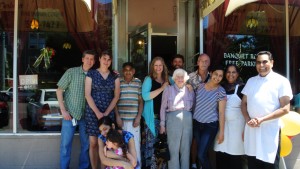
They operated as a business, but it didn’t feel like a business. It was a place where you wanted to give your money because you can’t put a price on caring. Tandoor was our home away from home and we are grateful that they took us under their wing. Like the time I got intoxicated tasting different wines in preparation for my birthday party and Razzi let me lie in the back room while they played with Polina, or the many times they entertained Polina so Pete and I could enjoy our meal. Or the free lassis (made with homemade yogurt) that they gave to Polina. They showed her off to her parents in the kitchen. They treated her as their own. There isn’t a price for that.
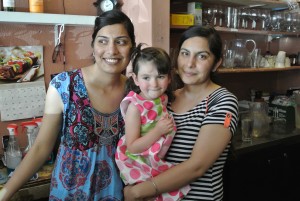
The family consisted of the parents, two daughters, a son, and two hired helpers. Aman, the oldest sister, wanted to finish her coursework to become a dental hygienist. Razzi, the middle child, was studying to become a pharmacist. It didn’t work out that way for either of them. The hours at the restaurant proved to be too much. Six days a week, 12 hour days. Their only day off was on Tuesdays. Tandoor was their home away from home but for very different reasons than it was for us. We had the luxury of leaving. They didn’t turn the lights off until late into the night.
One of the things that I found amazing is that while the entire family is vegetarian, the restaurant won an award for the best butter chicken. When I asked Razzi how her father did it, she replied, “He can taste the sauce.”
The naan was feather-like, not bread-like at all. You had to eat it quickly to taste the doughy texture, otherwise it would dry out from evaporation. It was made in a real Tandoor oven heated to 800 degrees Farenheit. Aman said it took over an hour to heat up in the morning. Imagine needing that much energy for each naan delivered to the table. Harjit, who is Razzi and Aman’s mother, made the most perfect naan with barely a burn mark on it. She pulled out the naan with her bare hands sometimes when her instruments didn’t work. She pulled out the naan with her bare hands from an 800 degree oven. I wonder how many people realized the skill that went into making each naan as they chatted or interfaced with their smartphone.
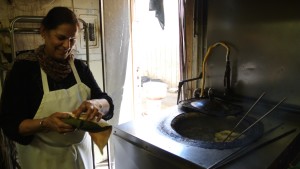
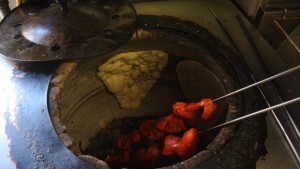
When I stepped into the kitchen for the first time on the last day, I was shocked by how hot it was in there. Most people entering the restaurant would only see the smiles, not the incredibly hard work that occured behind the scenes. We’ve been there often enough and long enough to know that their smiles are genuine. They are a family that pulls together.
We always came for the buffet. Over the years, I developed a routine. Two additional napkins, one for Polina and one for Pete. I went for the same dishes. So did Pete and Polina for that matter.. We each had our favorites. One thing that kept us coming back was the unlimited chai. Other places charged extra for chai. They never did. Their prices were always reasonable. For the price of a meal at McDonald’s you could treat yourself to an Indian buffet. What a choice. We wondered how the Jack-in-the-Box across the street stayed open. How ironic that they remain open.
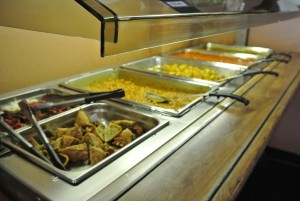
Tandoor was a place where I heard some of the most interesting conversations. (I didn’t mean to, but I was sitting a few feet away.) In the University District, or U-district as the locals call it, there are many people who are paid or pay money to think. It’s where I heard about the future of green energy, ideas about the future of theater, and a conversation about a customer’s family. Tandoor provided a place for people to build relationships.
On their last day of business, the till was quiet. Quietly and without fanfare, they gave free meals to everyone. People who had walked in for the first time were also treated. We were pleasantly surprised and humbled by their generosity. Over the years I had seen them give food to people who looked like they needed it. On their last day, they gave to everyone. Their last day of operation encapsulated the spirit of this family and business.
Aman now works for a major home improvement store while Razzi works as a receptionist for a beautician. Their youngest brother is taking coursework for medical school. Their father wants to take a break from running a restaurant and work for someone else for a change, while their mother is finally getting a long-deserved break. Everyone works together to support each other. That is the strength of this family, and how they will survive, no matter what.
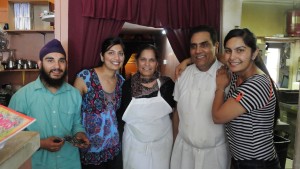
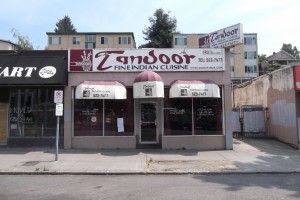
Wonderful article, showing the very human side of an awesome mom and pop Indian restaurant! Great job. 🙂
Thank you so much : )